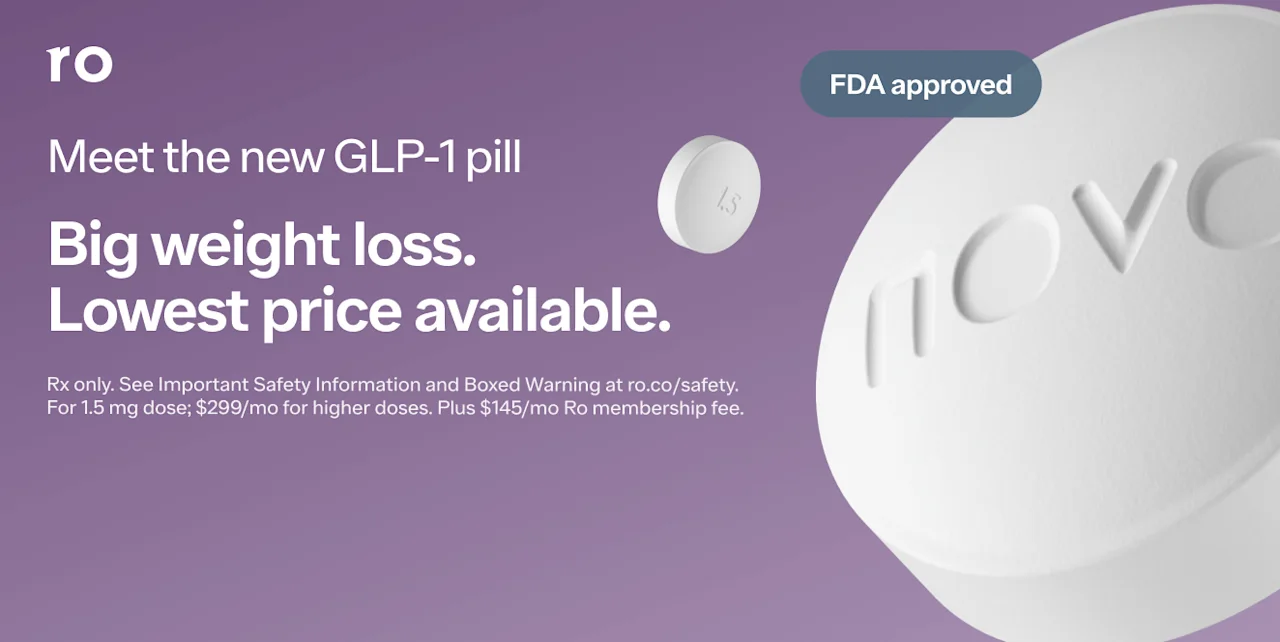Key takeaways
You can take Rybelsus (oral semaglutide) for weight loss, even if you don’t have diabetes — as long as it’s prescribed by and under the care of a licensed healthcare provider.
People without diabetes may lose up to 6% of their body weight after one year of taking Rybelsus.
Rybelsus can be an option for those who have modest weight loss goals or a fear of needles, but it’s generally less effective at weight loss than injectable medications.
Here's what we'll cover
Here's what we'll cover
Here's what we'll cover
Key takeaways
You can take Rybelsus (oral semaglutide) for weight loss, even if you don’t have diabetes — as long as it’s prescribed by and under the care of a licensed healthcare provider.
People without diabetes may lose up to 6% of their body weight after one year of taking Rybelsus.
Rybelsus can be an option for those who have modest weight loss goals or a fear of needles, but it’s generally less effective at weight loss than injectable medications.
Rybelsus is an oral prescription medication for diabetes that contains semaglutide. Yup, the same active ingredient as that in Ozempic, Wegovy, and Wegovy pill, all of which are known for producing weight loss. So, can Rybelsus be taken for weight loss in non-diabetics?
Technically, yes, people without diabetes can take Rybelsus for weight loss. But they would be doing so off-label, and other medications may be more effective for that use. (Remember: You should only take drugs that are prescribed to you by a healthcare provider, no matter if they’re off- or on-label.)
Below, we’ll review those options and share how much weight you can expect to lose on Rybelsus if you don’t have diabetes.
Can you take Rybelsus if you don’t have diabetes?
Yes, you can take Rybelsus if you don’t have diabetes — that is, as long as it’s prescribed by and under the care of a licensed healthcare provider.
Rybelsus is approved by the US Food and Drug Administration (FDA) to treat type 2 diabetes. So, if your healthcare provider prescribes it for weight loss, it’s considered an off-label prescription. Meaning, it’s being prescribed for a reason other than the FDA-approved indication.
Off-label prescribing is a permitted and common practice that allows healthcare providers to use their expertise to determine the best treatment option for a particular patient.
“While Rybelus can produce weight loss, it's generally not the first choice for weight management alone,” says Fernando Ovalle, Jr, MD, a double board-certified obesity medicine specialist and plastic surgeon.
The Wegovy pill and injectable semaglutide (Wegovy, Ozempic) can cause greater weight loss, typically around 14% and 15% of body weight compared to Rybelsus’ 6%--10%.
Having said that, there are scenarios when a provider may prescribe Rybelsus for weight loss in patients without diabetes, Dr. Ovalle says. These include when a person:
Has modest weight loss goals (~5%–10%)
Is assessing whether they can tolerate GLP-1s before transitioning to injectables
Can’t use injectable semaglutide due to a fear of needles
Prefers oral medication
Can’t afford Wegovy
What happens when someone without diabetes takes Rybelsus?
When someone without diabetes takes Rybelsus, they’ll typically lose weight.
In one study of non-diabetics, people lost nearly 6% of their body weight after one year of taking Rybelsus.
Dr. Ovalle says Rybelsus offers several other health benefits for people without diabetes, including:
Reduced hunger and increased satiety, making it easier to stick to a weight loss diet
Improved blood pressure and cholesterol levels
Lowered risk of type 2 diabetes in people who have prediabetes or are otherwise at risk
Better sleep, mobility, and quality of life (weight loss often improves these health markers in people with obesity)
Potential side effects of Rybelsus in non-diabetic users
The side effects of Rybelsus are the same, regardless of whether you have diabetes, Dr. Ovalle says. These side effects include:
Abdominal pain
Diarrhea
Decreased appetite
Vomiting
Generally, Rybelsus side effects are dose-dependent, meaning they are worse with higher doses. However, they tend to improve as you gradually increase the dose and adjust your diet, Dr. Ovalle says.
People with a personal or family history of medullary thyroid carcinoma (MTC) or multiple endocrine neoplasia syndrome type 2 (MEN2) should not take Rybelsus. Rare but potential risks of taking Rybelsus include:
Acute pancreatitis
Diabetic retinopathy (diabetes-related vision changes)
Hypoglycemia (low blood sugar)
Kidney or gallbladder problems
Allergic reactions
Severe gastrointestinal reactions
Pulmonary aspiration during general anesthesia or deep sedation
Is Rybelsus approved for weight loss?
No, Rybelsus is not approved for weight loss.
The FDA has only approved Rybelsus to:
Improve blood sugar control in adults with type 2 diabetes, along with diet and exercise
Reduce the risk of major cardiovascular events like heart attack or stroke in adults with type 2 diabetes
Research on Rybelsus and weight loss in non-diabetic patients
Most of the research on Rybelsus for weight loss has been conducted in people with type 2 diabetes, since it’s a diabetes medication.
However, there is a small study of 93 adults without diabetes that’s worth calling out.
In this study, those who took 14 mg of Rybelsus daily for one year:
Experienced an average weight loss of 5.7% or about 13 pounds
Lost a little more than 2 inches off their waistlines
How does Rybelsus work for weight loss?
Rybelsus works by mimicking GLP-1, a natural hormone that regulates appetite and glucose metabolism. By mimicking GLP-1 and activating its receptors, Rybelsus:
Slows down stomach emptying, helping you feel full sooner
Sends signals to your brain that reduce appetite, so you’re satisfied with smaller portions
Lowers blood sugar, helping prevent spikes and crashes
Together, these effects can cause you to eat less and, in turn, lose weight.
How much weight can you lose on Rybelsus?
People without diabetes may lose nearly 6% of their body weight (13 pounds) after a year on Rybelsus, according to a small study.
People with diabetes tend to lose less weight on Rybelsus. For example, research shows people taking Rybelsus for diabetes may lose 7.5 pounds after a year and a half of treatment.
Rybelsus vs. Wegovy pill
The Wegovy pill is a higher-dose version of oral semaglutide that received FDA approval in December 2025. It became available in the US in early January 2026.
Like Rybelsus, the Wegovy pill:
Is a daily oral tablet
Contains semaglutide as its active ingredient
Is taken once daily on an empty stomach in the morning, 30 minutes before drinking, eating, or taking other oral medications
Unlike Rybelsus, the Wegovy pill:
Is FDA-approved for weight loss and management and to reduce cardiovascular risk in adults with cardiovascular disease and obesity or overweight
Comes in 1.5 mg, 4 mg, 9 mg, and 25 mg dosage strengths
Has been shown to produce more weight loss
In clinical trials, adults with overweight or obesity who took 25 mg of oral Wegovy daily lost 13.6% of their body weight after 64 weeks, and those who took 50 mg daily lost 15% after 68 weeks.
Rybelsus vs. other oral GLP-1s
Other oral GLP-1s are currently being studied for weight loss. Most notably:
Orforglipron is an oral GLP-1 for weight loss and diabetes that’s still in development. In clinical trials, adults with overweight or obesity lost an average of 9.4% to 14.7% of their body weight after 36 weeks.
Alternatives to Rybelsus for weight loss
There are several other medications that are currently approved for weight loss — unlike Rybelsus, which is only approved for type 2 diabetes. These include injectable GLP-1s and oral weight loss pills.
FDA-approved GLP-1 weight loss injections include:
Wegovy (semaglutide). Wegovy contains the same active ingredient as Rybelsus but in injectable form. In clinical trials, this once-weekly injection produced an average weight loss of 14.9% in 68 weeks.
Saxenda (liraglutide). Saxenda is a daily injection. In clinical trials, it produced an average weight loss of up to 8% in one year.
Zepbound (tirzepatide). Zepbound is a weekly injection that’s not only a GLP-1 but also a GIP. Meaning, it targets two hormones instead of one to cause even more weight loss. In clinical trials, it produced an average weight loss of up to 25% in 88 weeks.
FDA-approved weight loss pills include:
Xenical (orlistat). This thrice-daily pill works by reducing the amount of fat your body absorbs from the foods that you eat. In clinical trials, people taking Xenical lost 10% of their body weight in one year.
Qsymia (phentermine/topiramate). This daily pill is a stimulant that suppresses your appetite. In clinical trials, people lost up to 9% of their body weight in one year.
Contrave (naltrexone/bupropion). This twice-daily pill is another stimulant that suppresses your appetite. In clinical trials, people lost about 6% of their body weight in one year.
Bottom line
While Rybelsus can produce modest weight loss in people without diabetes, it’s not FDA-approved for that purpose. Plus, it’s less effective than the Wegovy pill and injectable GLP-1 drugs. Here’s what you need to know if you’re curious about Rybelsus and weight loss and you’re not diabetic:
Rybelsus may help non-diabetic patients lose about 6% of their body weight in a year.
Rybelsus works by mimicking the natural GLP-1 hormone to reduce appetite, slow digestion, and lower blood sugar — all of which can lead you to eat less and lose weight.
Side effects of the drug, like nausea and diarrhea, are similar for people with and without diabetes.
Those seeking greater weight loss results may want to consider alternatives, such as the Wegovy pill (expected to launch in early 2026), injections like Wegovy, Zepbound, or other FDA-approved weight loss medications.
Frequently asked questions (FAQs)
Can I take Rybelsus if I don’t have diabetes?
Yes, you can take Rybelsus for weight loss if you don’t have diabetes, if it’s prescribed by and under the care of a licensed healthcare provider. Taking Rybelsus without diabetes would be considered an off-label use. That’s because the drug isn’t FDA-approved for weight loss but rather to treat diabetes and reduce cardiovascular risk.
How much weight can you lose on Rybelsus in a month?
How much weight you lose on Rybelsus in a month can depend on your starting body weight, adherence to treatment, and changes to diet and exercise. In one study, people with type 2 diabetes lost about 6 pounds after three months of taking Rybelsus.
Will insurance cover Rybelsus for weight loss if I don’t have diabetes?
Probably not, since Rybelsus is approved for type 2 diabetes, not for weight loss. Insurance companies typically only cover a medication when it is prescribed for an FDA-approved indication.
What’s the difference between Rybelsus and the oral version of Wegovy that’s being studied?
Both Rybelsus and the oral version of Wegovy (the Wegovy pill) contain the active ingredient semaglutide and are daily pills. The two treatments differ in their approved uses, dosage strengths, and effectiveness. Plus, the Wegovy is expected to launch in the US in early 2026. Rybelsus, on the other hand, has been available for years.
Here’s a side-by-side comparison:
| Rybelsus | Wegovy pill |
|---|---|---|
Active ingredient | Semaglutide | Semaglutide |
FDA approval | Approved in 2019 | Approved in late 2025 |
What it treats | Type 2 diabetes (T2D) in adults, along with diet and exercise Cardiovascular risk reduction in adults with T2D | Weight loss in adults with obesity and overweight Cardiovascular risk reduction in adults with cardiovascular disease and obesity or overweight |
How it’s taken | Daily, in the morning, at least 30 minutes before food, water, or other medications | Daily, in the morning, at least 30 minutes before food, water, or other medications |
Dosage amounts | Formulation R1: 3 mg, 7 mg, 14 mg Formulation R2: 1.5 mg, 4 mg, 9 mg | 1.5 mg, 4 mg, 9 mg, 25 mg |
Common side effects | Nausea, stomach pain, diarrhea, decreased appetite, vomiting, constipation | Nausea, vomiting, constipation, indigestion, diarrhea (based on available research) |
DISCLAIMER
If you have any medical questions or concerns, please talk to your healthcare provider. The articles on Health Guide are underpinned by peer-reviewed research and information drawn from medical societies and governmental agencies. However, they are not a substitute for professional medical advice, diagnosis, or treatment.
Ozempic Important Safety Information: Read more about serious warnings and safety info.
Wegovy Important Safety Information: Read more about serious warnings and safety info.
GLP-1 Important Safety Information: Read more about serious warnings and safety info.
Saxenda Important Safety Information: Read more about serious warnings and safety info.
Zepbound Important Safety Information: Read more about serious warnings and safety info.
References
Bonora, B. M., Russo, G., Leonetti, F., et al. (2024). Effectiveness of oral semaglutide on glucose control and body weight up to 18 months: a multicenter retrospective real-world study. Journal of Endocrinological Investigation, 47(6), 1395–1403. doi: 10.1007/s40618-024-02309-2. Retrieved from https://pmc.ncbi.nlm.nih.gov/articles/PMC11142994/
Candido, R., Di Loreto, C., Desenzani, P., et al. (2024). Suitability and Usefulness of a Flexible Dosing Timing of Oral Semaglutide to Maximize Benefit in Clinical Practice: An Expert Panel. Diabetes Therapy: Research, Treatment and Education of Diabetes and Related Disorders, 15(9), 1963–1977. doi: 10.1007/s13300-024-01625-3. Retrieved from https://pmc.ncbi.nlm.nih.gov/articles/PMC11330423/
Gabe, M. B. N., Breitschaft, A., Knop, F. K., et al. (2024). Effect of oral semaglutide on energy intake, appetite, control of eating and gastric emptying in adults living with obesity: A randomized controlled trial. Diabetes, Obesity & Metabolism, 26(10), 4480–4489. doi: 10.1111/dom.15802. Retrieved from https://dom-pubs.pericles-prod.literatumonline.com/doi/10.1111/dom.15802
Gibbons, C., Blundell, J., Tetens Hoff, S., et al. (2021). Effects of oral semaglutide on energy intake, food preference, appetite, control of eating and body weight in subjects with type 2 diabetes. Diabetes, Obesity & Metabolism, 23(2), 581–588. doi: 10.1111/dom.14255. Retrieved from https://pmc.ncbi.nlm.nih.gov/articles/PMC7839771/
Isaacs, D. M., Kruger, D. F., & Spollett, G. R. (2021). Optimizing Therapeutic Outcomes With Oral Semaglutide: A Patient-Centered Approach. Diabetes Spectrum: A Publication of the American Diabetes Association, 34(1), 7–19. doi: 10.2337/ds20-0016. Retrieved from https://pmc.ncbi.nlm.nih.gov/articles/PMC7887531/
Knop, F. K., Aroda, V. R., do Vale, R. D., et al. (2023). Oral semaglutide 50 mg taken once per day in adults with overweight or obesity (OASIS 1): a randomised, double-blind, placebo-controlled, phase 3 trial. Lancet (London, England), 402(10403), 705–719. doi: 10.1016/S0140-6736(23)01185-6. Retrieved from https://pubmed.ncbi.nlm.nih.gov/37385278/
Krajnc, M., Kuhar, N., & Koceva, A. (2025). Oral semaglutide for the treatment of obesity: a retrospective real-world study. Frontiers in Endocrinology, 16, 1593334. doi: 10.3389/fendo.2025.1593334. Retrieved from https://pmc.ncbi.nlm.nih.gov/articles/PMC12158668/
Novo Nordisk. (2025). Press Release: FDA accepts filing application for oral semaglutide 25 mg, which if approved, would be the first oral GLP-1 treatment for obesity. Retrieved from https://www.novonordisk-us.com/media/news-archive/news-details.html?id=915988
Ryan, D. H. & Yockey, S. R. (2017). Weight Loss and Improvement in Comorbidity: Differences at 5%, 10%, 15%, and Over. Current Obesity Reports, 6(2), 187–194. doi: 10.1007/s13679-017-0262-y. Retrieved from https://pmc.ncbi.nlm.nih.gov/articles/PMC5497590/
Tchang, B. G., Aras, M., Kumar, R. B., et al. (2024). Pharmacologic Treatment of Overweight and Obesity in Adults. Endotext. Retrieved from https://www.ncbi.nlm.nih.gov/books/NBK279038/
U.S. Food and Drug Administration (FDA). (2025). Highlights of Prescribing Information: Rybelsus (semaglutide) tablets, for oral use. Retrieved from https://www.accessdata.fda.gov/drugsatfda_docs/label/2025/213051s024,s028s029lbl.pdf
U.S. Food and Drug Administration (FDA). (2025). Highlights of Prescribing Information: Wegovy (semaglutide) injection, for subcutaneous use Wegovy (semaglutide) tablets, for oral use. Retrieved from https://www.accessdata.fda.gov/drugsatfda_docs/label/2025/218316Orig1s000lbl.pdf
Wharton, S., Blevins, T., Connery, L., et al. (2023). Daily Oral GLP-1 Receptor Agonist Orforglipron for Adults with Obesity. The New England Journal of Medicine, 389(10), 877–888. doi: 10.1056/NEJMoa2302392. Retrieved from https://www.nejm.org/doi/10.1056/NEJMoa2302392
Wharton, S., Lingvay, I., Bogdanski, P., et al. (2025). Oral Semaglutide at a Dose of 25 mg in Adults with Overweight or Obesity. The New England Journal of Medicine, 393(11), 1077–1087. doi: 10.1056/NEJMoa2500969. Retrieved from https://pubmed.ncbi.nlm.nih.gov/40934115/
Wilding, J. P., Batterham, R. L., Calanna, S., et al. (2021). Once-Weekly Semaglutide in Adults with Overweight or Obesity. New England Journal of Medicine, 384(11), 989–1002. doi: 10.1056/nejmoa2032183. Retrieved from https://www.nejm.org/doi/10.1056/NEJMoa2032183













